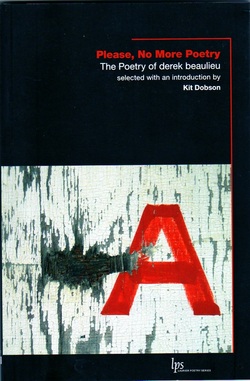
There is probably no prize for identifying the title and subtitle as a curiosity-raising paradox. What is this? – a book of poetry that wants to be last book of poetry? – that wants no competitors to follow it? (Good luck!) Or is the “poetry” of the subtitle different from the “poetry” of the title? If so, surely the press could have given the reader a little typographical hint, perhaps putting the second “poetry” in all lower case, or in quotation marks? Dobson’s introduction, however, indeed indicates that the two “poetry” words are different, quoting beaulieu on his being a poet who is “concerned with exploring forms that move away from the ‘the poem as finely wrought epiphanic moment of personal reflection,’” and who “‘abandons narrative intention in favour of compositional intention.’” He quotes beaulieu again as having asserted that “poetry is no longer the beautiful expression of emotive truths; it is the archaeological arrangement of the remains of an ancient civilization.”
So the “no more poetry” that the title wants to see no more of is the poetry that attempts “the beautiful expression of emotive truths,” that aspires to “a finely wrought epiphanic moment of personal reflection” or to a vivid narrative of event or reflection. In such theoretical statements beaulieu has not been wary of binary oppositions – “narrative intention” is undesirable, “compositional intention” desirable; “beautiful expression of emotive truths” is undesirable, “archaeological rearrangement” desirable. Through these binaries beaulieu is joining the attack on the lyric poem that began back at least as far back as the 1950s with Olson’s critique of the “private-soul-at-any-public-wall” and Duncan’s scathing’s denunciations of poets who wrote poems in order to publicize themselves and aggrandize their careers. Paradoxically, of course, outrageous binary oppositions can help build a poet’s career, as in Irving Layton’s amusingly
 RSS Feed
RSS Feed